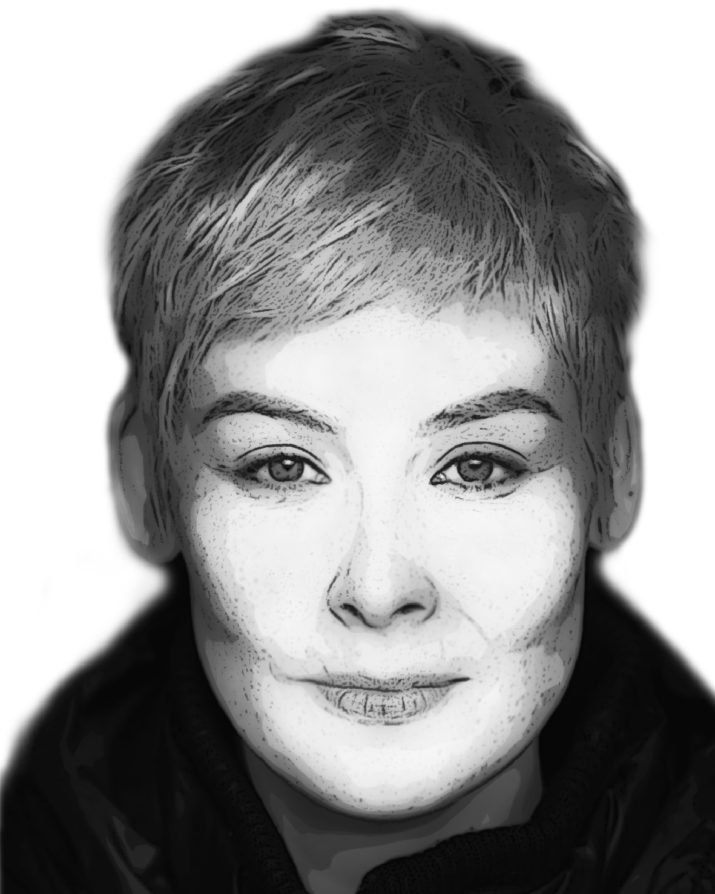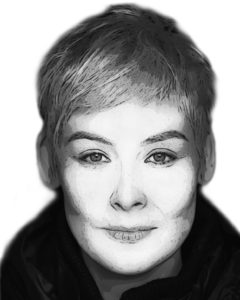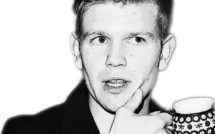

Translated from the Finnish by Owen Witesman.
This is part of our special feature, New Nordic Voices.
Imagine you are partially blind. Minus eleven diopters. Imagine a dark exam room at an optometrist’s office. You’re sitting in a comfortable leather chair, afraid you’ll lose your sight entirely. You’ve carefully placed your old glasses on the table. The plastic rims, electric-blue ten years ago, are scuffed now. You repaired one arm with tape, which you painted blue with permanent marker. For years you’ve preferred seeing poorly to discovering the true state of your vision. You’ve pushed away the idea of going to the optometrist the same way other people put off going to the dentist. You know those people. Their breath smells, and they know it. They always speak in a slight mumble, tilting their mouth down and away. They take a step back whenever someone comes too close. But what you’ve put off is this vision exam. Every year you’ve acted more strangely, more absent-mindedly— that’s your excuse. As soon as something resembling a human appears on the horizon, you lower your gaze to the street, just in case. Your friends play along with the game. “How’s that castle in the sky coming?” “Yoo-hoo, anyone home in there?” They wave their hands in front of your eyes as if wiping snow from the windshield of a car. You laugh and tell them what’s weighing on your mind this time. Of course you’re lying. At least a bit. You fabricate more details than necessary. You don’t want to remember that reality isn’t a fog. It isn’t a shared twilight we all fumble through. Reality has terrible clarity. You don’t want to admit that you are seen but you do not see, not now, perhaps not ever again. You’re terrified. You fear that the world will run out of lens strengths, Coke-bottle glasses, and minuses. That the next time they’ll hand you a white cane, encourage you to get a guide dog, a set of talking bathroom-scales, stickers for your computer keyboard . . . But don’t think of these things now. Focus on imagining the dimexam room, the back half of the dim room, the white chart on a white, illuminated wall. It’s the old-fashioned kind of chart nowhere has any more. The chart has “E”s pointing in four directions. Letters you can’t see now.
The optometrist begins loading lenses into the device resting on the bridge of your nose. Minus eleven diopters, and you see as you do through your glasses. Poorly, murkily at best, but just enough that you can get by. You can only clearly make out the top row of “E”s—the final letter on the following line gives you trouble. Your heart pounds with terror, but let it pound. Focus your thoughts on this brief moment, this blink of an eye, because this is the moment you must be able to imagine. The optometrist adding sharpness to your gaze, one lens at a time.
Move your eyes to the tiny, ant-sized letters on the bottom edge. Things start to happen when you stop being afraid and let time slow down. No lenses are necessary any more, for the desired clarity has been achieved: the tiny creatures have begun to move. They wriggle and tremble and jerk like black pieces of string on an excessively clean floor. Like when you were a child. Don’t you remember? You stared at that piece of string hanging from the arm of a chair, head full of blood, eyes heavy with pressure. Then the black snake began to dance. It had its very own rhythm, unfailingly repeating its pattern. That was the magic of your eyes, the magic of your retinas.
Now you’re sitting in a comfortable, plush chair where the feeling of heaviness completely disappears. A movie is starting, and the screen is full of light even before the film has begun to roll. But this time more than light fills the screen, because something is stuck to the film gate. Bits of fuzz that vibrate in the air from the fan. You count them to pass the time. There are six in all. Hairs from the projectionist’s knuckles? Are they hairs? But don’t think of men right now. Stare at the bright white screen and the six pieces of fuzz. They’ve moved close enough now that you have to believe: a woman, each and every one. And they aren’t thin bits of fuzz any more, except one of them, the one in the middle, who remains terribly skinny. She walks a little ahead of the others, pulling the rest behind like the leader of a wedge of cranes. An enormous, auburn cloud of curls bounces as she takes nimble, swaying steps through the air on nothing. Behind her walk five women, two to the left, three to the right. They tread the air as if treading water, with some effort, except one who appears to dance.
The women are easy to tell apart. The one to the left has enormous, swinging breasts that barely fit in her magenta polo shirt even though four of the five buttons hang undone. The breasts belong to a sturdy brown-skinned woman, whose face is blank just now, lacking any expression. Next to her traipses a mound of stomach, a blond, pregnant woman dressed in a black shirt and turquoise trousers. She exudes health and wealth. She is wrinkle-free, stain resistant, and Top Quality.
To the right of the emaciated woman with the curls strides an overweight matron, with smeared make-up wearing a knee-length sable fur coat. On one foot she wears a red woolen sock, on the other a heavy boot that extends to her knee. Next to her skips a tall, copper-brown beauty in a yellow dress with an enormous Afro. On the outside right, a little separated from the others, slinks a bald, shrive-led woman in a poison-green hospital gown, looking like the most woebegone creature imaginable.
Six women walk toward you out of the white emptiness. You start, as if waking from a dream, turning around, looking to either side, up and down. But you see nothing to anchor your gaze, nothing beyond this peculiar company floating ever closer.
You feel faint. You feel your ears stopping up, your head ringing. Your legs give way. You fall into something. It isn’t soft and it isn’t hard. Not cold, not hot. You collapse into it as if resting in snow. You close your eyes and wait to wake up somewhere else. At the movies? Just before the end of Solaris? In that moment when the camera rises into the sky, revealing that Kris Kelvin’s homecoming is a dream, an island on the planet’s surface surrounded by a sea with no shore, when the clamorous music accompanying the final scene begins to surge, to penetrate your body chilled by a fitful sleep. Suddenly the music stops, and you stare in unbearable silence at the white screen and the black letters there: КОНЕЦ ФИЛЬМА. You hear nothing but your own heart, which still pumps in time with the music.
Do you believe you’ll wake up that way again this time?
You hear sounds of movement and can’t bear not to peek. Instead of moviegoers rustling as they leave the theater, you see those women before you, those six beings who appeared from nothingness. They’ve fallen to their knees next to you and surround you on all sides.
Suddenly the leader, the one who’s all skin and bones, begins to tug the shoes from your feet. She pulls off your corduroy trousers and underwear, and bends your knees as she spreads your legs. Two of the women hold your ankles tight, and two grab your arms. The sad one with no hair has lifted your neck onto her knees and gently strokes your hair.
The thin woman shoves her head between your legs, and you do exactly what is best for you in this situation. You close your eyes again. You submit. You let it happen, because that’s all you can do. You feel the cool, soft tip of the tongue begin to dig into you. It seeks and finds your most sensitive spot. No evil is being done to you. The bony one seems to know how to satisfy a woman. She takes the hood of the clitoris between her lips and sucks out the tiny protuberance hiding beneath. The glans clitoridis. Or, if you please: the tongue of Cleite the warrior queen, the pink joy buzzer, the love button, the little man in the boat, the devil’s burning teat . . . This she energetically begins to lick, at once strongly and lightly, varying the rhythm with purpose, now pressing more, now brushing only gently.
You submit. You want nothing else.
How is it possible to think of pleasure? You can’t. Instead think of light. Bright, eyelid-penetrating light. You become part of the orange flame, the solar wind, the plasma flares, the throbbing coronal holes. Within you is the core of the universe, a mysterious generator, that divine nodule with its perfect minefield of eight thousand nerve endings that send fibers all the way to the spinal cord and central nerv-ous system, all the way to the sun and the foundations of the universe.
Your body tenses, preparing for the wave beginning to form deep inside. The surge builds from small, tenuous pulses, radiating ripples to every part. In your toes and fingertips they turn, changing direc-tion, washing back with a greater roar toward the center, shrinking to a single leaden point and diving in. One ring. Two rings. Three rings. Four. Each heavier than the last, each plunging deeper. Five. It almost makes you ache, that gathering—soon nothing more will fit, your body will no longer be able to keep them in. Six. Then comes the seventh ring. It dives so deep that it no longer touches you. It pushes through to a place with no return. Your body knows it. The tension in your muscles begins to release. You know this feeling of irrevoca-bility, the precise feeling that makes pleasure cause dependency. The second before orgasm. The seventh ring, which pulls all the rings with it in a wave, launching them out of their hideaway one by one—opening, expanding, and finally exploding against your pelvic diaphragm.
The women have released their grip on you. They stare intently at your cringing face, your head resting in the bald woman’s lap, your mouth releasing a scream, your rising wail. You bathe in cold-hot sweat, your back arching. Your eyes are still closed, and that is good, because when you open them, nothing will be as it was. Believe me.
Agitated words fly all around, the ends of each sentence rising. Questions, in four languages. If only you could catch hold of even one of them, if only you could understand. Kto vy? Otkuda vy? Oh, how they wish the joy of understanding would spread across your face, the blissful experience of familiarity as you hear your mother tongue after this shock, this earth-shattering pleasure. De onde você vem? Quem é você? They so hope for you to find a citizen of your land, a sister, a friend, a kindred spirit in their group. Qui êtes-vous? D’où venez-vous? If only you would open your mouth and tell them what you know. Who you are, where you come from. That’s what they want to hear: where you come from and, above all, how you came. And why you’re here now too.
You open your eyes. The thin woman crouches between your legs, bony fingers removing hairs from her mouth. She wipes the small black curls on your knee like the tablecloth of a fine restaurant. Black curls? You look at your hands. They are the hands of a young girl. The nails are round, cut short, every other one painted black or white. You look at your bent legs. They’re smoother, and much, much more petite, and lighter. Blue veins shine through the skin, you’ve become so white. You lift your left leg. It rises easily. It’s so light and lithe you could easily swing it over your own head. Yes, you have the supple legs of a young girl. You lower your leg again, next to the other, and open your mouth, but nothing comes out.
Good morning, Sleeping Beauty, the thin woman says a little hoarsely, where do you come from? Her voice is powerful, and strangely low for such a frail body. She places both hands on your knees, spreading your legs a little and extending her neck toward you. Her voice rises, softening, becoming slightly more friendly, almost inquisitive. Who are you?
You say one single word. A name. You say it in the voice of a young girl shrill from crying. The voice that a lost child might use when a nice adult kneels and tries to help, offering to go together to find a lost mother in the crowd.
You say: Ul-ri-ke.
You pronounce each syllable in turn, with a tearful insistence that both demands and pleads. You practically beg. Sobbing, you tell them who you are.
You are Ulrike, and you are seventeen.
You don’t know where you’re coming from, but your home is in Austria. In Salzburg.
Laura Lindstedt (b. 1976) burst onto the Finnish literary scene in 2007 with her debut novel Scissors, which earned her a nomination for the Finlandia Prize, the country’s most prestigious literary honour. Lindstedt’s second novel Oneiron has continued Lindstedt’s critical success, earning her the 2015 Finlandia Prize. She lives in Helsinki.
Owen Witesman has translated dozens of Finnish into English. He holds a BA in Linguistics from Brigham Young University and two degrees from Indiana University: an MA in Central Eurasian Studies and a PhD in Public Affairs. He works full time as a literary translator and lives in Springville, Utah.
Excerpted from ONEIRON by Laura Lindstedt. Published by Oneworld Publications. Copyright © 2018 by Laura Lindstedt. English translation copyright © Owen Witesman.
Published on April 17, 2018.




